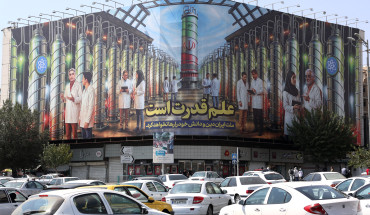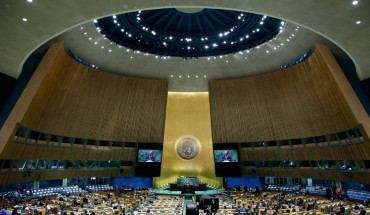
Full Event Summary
On November 30, 2010 the Center for Turkish Studies hosted a panel discussion onTurkey’s engagement in Iraq, particularly on the recent developments regarding the formation of anew Iraqi government. CTS Executive Director, Dr. Gonul Tol, moderated the discussion, which featured keynote speakers Qubad Talabani, Charles Dunne and Can Oğuz.
Can Oğuz, a Councelor at the Turkish Embassy in Washington, opened the discussion by emphasizing the importance of Iraqi stability in maintaining the stability and prosperity of the entire region. He asserted that Turkey, in particular, is strongly affected by conditions in Iraq and, thus, has a vested interest in engaging with the Iraqi government to help it maintain both social and economic stability. Recent diplomatic gestures, such as the opening of a Turkish consulate general in both Basra and Arbil in 2009, and diplomatic visits to Iraq by Turkey’s leaders, have shown clear evidence of this interest. Additionally, Mr. Oğuz emphasized Turkey’s supportive stance towards Iraq’s efforts to develop a power sharing government that represents all sectors of Iraqi society. According to Mr. Oğuz, Turkey has been pleased with the government formation process so far and is both eager and willing to continue its strategic cooperation with the Iraqi government as soon as the process is complete. This strategic cooperation will include efforts on the part of Turkey to help reform Iraqi society and bolster Iraq’s trade, energy and construction sectors, all of which will promote Turkey’s political and economic interests. To exemplify these potential benefits, Mr. Oğuz asserted that a surge in Turkish-Iraqi strategic cooperation in recent years has yielded a significant boost in Turkish exports to Iraq, which reached $5.1 billion in 2009, and bilateral trade between the two countries, which has now surpassed $6 billion. Finally, Mr. Oğuz affirmed that Turkey’s desire to stabilize Iraq is also strongly motivated by security concerns, since Turkey still faces terrorist threats from militant factions of the PKK in Iraq’s autonomous Kurdish region. For all of the stated reasons Turkey will continue to develop its strategic cooperation with Iraq, as well as coordinate its stability-enhancing efforts with those of the United States, which shares many of Turkey’s same interests in regard to Iraq and the region as a whole.
Qubad Talabani, as Representative of the Kurdistan Regional Government (KRG) to the United States, works closely with the U.S. Government, the media and research institutions providing critical analysis and up-to-date information on Iraq and the Kurdistan Region.
After Operation Iraqi Freedom (Spring 2003), he served a year as Senior Foreign Relations officer for the Patriotic Union of Kurdistan (PUK) (one of the leading Kurdish political parties in Iraq), operating mainly out of Baghdad and Sulaimania. There, he worked closely with the U.S-led Coalition Office of Reconstruction and Humanitarian Assistance (ORHA), and was PUK’s top liaison to the Coalition after it became the Coalition Provisional Authority (CPA) and to US forces in Iraq. Mr. Talabani was also a key negotiator in drafting the Transitional Administrative Law (TAL), Iraq’s first post-Saddam constitution.
During the period 2001 - 2003, Mr. Talabani served first as a Special Assistant to the then PUK Representative in Washington and then later he served as the Deputy PUK Representative in Washington D.C.
Mr. Talabani is frequently interviewed by the popular press and other publications. He has appeared numerous times to discuss Kurdish and Iraqi issues on major television networks including: CNN, BBC, FOX News, and other American and international networks.
Mr. Talabani studied in London and holds a B.Sc. in Mechanical Engineering. His family has been involved in Kurdish politics for decades. His father, Jalal Talabani, is the President of the Republic of Iraq and Secretary General of the PUK.
Charles Dunne is a scholar with the Middle East Institute in Washington, D.C. Mr. Dunne served as the Director for Iraq at the National Security Department between 2005 and 2007.
Mr. Dunne is a scholar with the Middle East Institute in Washington, D.C. and a consultant specializing in the region. A former Foreign Service officer, he was Director for Iraq at the National Security Council between 2005 and 2007 and Foreign Policy Adviser to the Director for Strategic Plans and Policy at the Joint Staff in the Pentagon in 2007 - 2008. He also served as a member of the Secretary of State’s Policy Planning Staff. Mr. Dunne has appeared on BBC, Al-Jazeera and VOA television, and is frequently interviewed by VOA radio and AP on Iraq affairs. He has been a guest lecturer at Georgetown University and the National Defense University’s Near East South Asia Center. He contributes regularly to The American Interest Online.
Mr. Dunne holds an M.A. Arts in Arab Studies and a B.S. in Foreign Service from Georgetown University. He is an expert on Iraq and his areas of interest include regional military intelligence, democratization in the Middle East and strategic Policy.
Can Oğuz is currently a Counselor in the Turkish Embassy to the U.S. Mr. Oğuz worked in the Deputy Directorate General for Iraq at the Ministry of Foreign Affairs of the Republic of Turkey in 2008 – 2010.
Mr. Can Oğuz has served in several capacities for the Ministry of Foreign Affairs of Republic of Turkey in the Deputy Directorate General for Multilateral Affairs between 2000 and 2003 and Deputy Directorate General for Iraq between 2008 and 2010. He also worked in Turkish Embassies in Baghdad (2003 – 2005) and London (2005 – 2008). Mr. Oğuz has been a Counselor in the Turkish Embassy to the U.S. since 2010.
Mr. Oğuz holds a Bachelor‘s Degree in International Relations from the Faculty of Political Sciences in the Ankara University.










